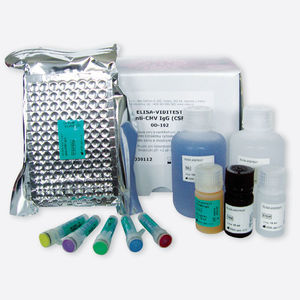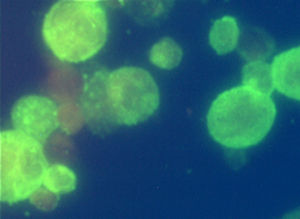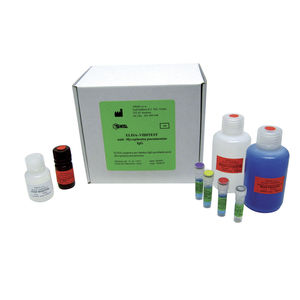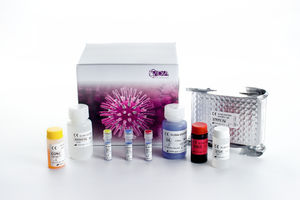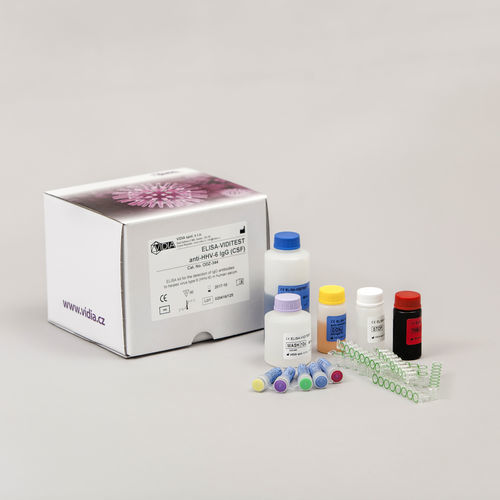
Infectious disease test kit ODZ-235IgGIgMHHV-6
Add to favorites
Compare this product
Characteristics
- Applications
- for infectious diseases
- Tested parameter
- IgG, IgM
- Micro-organism
- HHV-6
- Sample type
- serum, plasma, cerebrospinal fluid
- Analysis mode
- ELISA, immunofluorescence
- Format
- cassette
Description
The detection of herpes infections is based on the determination of antibody titers by ELISA. Monitoring of the dynamics of specific antibodies in the IgG and IM classes allows indirect diagnosis of diseases caused by or associated with this herpes virus.
For testing of the detection of anti-HHV-6 antibodies IgG and IgM isotypes in serum/plasma/cerebrospinal fluid, we provide our traditional immunoenzymatic kits ELISA-VIDITEST and MONO-VIDITEST and the IF-VIDITEST immunofluorescence kit. VIDITEST kits comes from our own research and production.
ELISA-VIDITEST uses 96-well microtiter plates, while MONO-VIDITEST cassette 12-well format. All testing and evaluation takes place automatically in combination with our VIDIMAT analyzer.
The ELISA-VIDITEST anti-HHV-6 IgG (CSF) kits can be used to calculate intrathecal synthesis of anti-HHV-6 IgG antibodies in cerebrospinal fluid.
Elevated IgG antibodies may be the only indicator of reactivated chronic central nervous system (CNS) HHV-6 infection.
The determination of the presence of IgG anti-HHV-6 antibodies allows assessment of the patient's immune status. The seroconversion or 4-fold increase of the antibody titer in paired samples indicate active infection.
About virus
Human herpesvirus 6 (HHV-6) is a double-stranded DNA virus in the subfamily Betaherpesviriniaea of the genus Roseolovirus. It was first discovered in 1986. The virus occurs in two unique variants, HHV-6A and HHV-6B. Within them, 95 % is sequence homology. Nevertheless, they differ in restriction endonuclease cleavage, monoclonal antibody response, virulence, and clinical manifestations of their infection.
Catalogs
No catalogs are available for this product.
See all of VIDIA s.r.o‘s catalogsRelated Searches
- Assay kit
- Solution reagent kit
- Blood assay kit
- Serum assay kit
- Immunoassay assay kit
- Plasma assay kit
- Infectious disease detection kit
- Rapid lateral flow test
- Laboratory reagent kit
- Immunoassay rapid diagnostic test
- Respiratory infection test kit
- Rapid virus test
- Clinical assay kit
- Infectious disease rapid diagnostic test
- Cassette assay kit
- Rapid respiratory infection test
- ELISA assay kit
- Urine rapid diagnostic test
- Blood sample reagent kit
- IgG test kit
*Prices are pre-tax. They exclude delivery charges and customs duties and do not include additional charges for installation or activation options. Prices are indicative only and may vary by country, with changes to the cost of raw materials and exchange rates.


